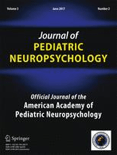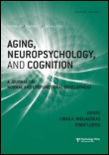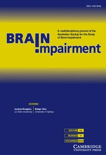
Journal of Pediatric Neuropsychology
Scope & Guideline
Empowering professionals to enhance children's neuropsychological outcomes.
Introduction
Aims and Scopes
- Pediatric Neuropsychological Assessment:
The journal prioritizes studies that explore methods and tools for assessing neuropsychological functions in children, including the validity and reliability of various assessment instruments. - Impact of Neurological Disorders on Development:
Research published in this journal often examines how neurological and neurodevelopmental disorders, such as ADHD, epilepsy, and dyslexia, influence cognitive and behavioral development in children. - Multidisciplinary Approaches to Neuropsychology:
The journal encourages interdisciplinary research that integrates findings from psychology, neuroscience, education, and medicine to provide a comprehensive view of pediatric neuropsychology. - Cultural and Socioeconomic Influences:
It also emphasizes the importance of understanding cultural and socioeconomic factors in neuropsychological outcomes and assessments, ensuring research is relevant to diverse populations. - Innovative Therapeutic Interventions:
The journal highlights innovative therapeutic interventions and emerging technologies, such as virtual reality and mobile applications, aimed at improving cognitive and behavioral outcomes in pediatric patients.
Trending and Emerging
- Impact of COVID-19 on Pediatric Populations:
There is a growing body of research focused on the effects of the COVID-19 pandemic on children's mental health, neurodevelopment, and educational outcomes, highlighting the need for adaptive strategies in response to this global crisis. - Screen Time and Digital Health:
Studies examining the relationship between screen time, emotional and behavioral functioning, and cognitive outcomes are trending, reflecting the increasing relevance of digital environments in children's lives. - Neuroimaging and Neuropsychological Integration:
Research exploring the integration of neuroimaging findings into neuropsychological assessment and interpretation is emerging, indicating a trend towards utilizing advanced technologies to inform clinical practices. - Cultural Competence in Assessments:
There is an increasing emphasis on understanding cultural and contextual factors in neuropsychological assessments, aiming to reduce biases and improve the applicability of findings across diverse populations. - Innovative Therapeutic Approaches:
The exploration of novel therapeutic interventions, particularly those leveraging technology and virtual reality, is gaining traction, reflecting a shift towards more engaging and effective treatment modalities for children.
Declining or Waning
- Traditional Assessment Methods:
There has been a noticeable decline in studies focusing on traditional neuropsychological assessment methods, possibly due to the increasing adoption of innovative, technology-driven approaches. - Generalized Studies on Common Disorders:
Research that broadly addresses common pediatric disorders without specific neuropsychological implications is less frequent, indicating a shift towards more specialized and nuanced investigations. - Legal and Ethical Discussions:
Themes related to legal implications of neuropsychological findings, particularly in juvenile justice, have diminished, suggesting a reduced focus on the intersection of law and neuropsychology.
Similar Journals

Revista Chilena de Neuropsicologia
Fostering Scholarly Exchange in NeuropsychologyRevista Chilena de Neuropsicología, published by Universidad de la Frontera, serves as a vital platform for the dissemination of research and advancements in the field of neuropsychology. This peer-reviewed journal aims to foster scholarly dialogue among researchers, professionals, and students, providing insights into the neuropsychological implications of various conditions and therapeutic interventions. By emphasizing high-quality, evidence-based studies, the journal significantly contributes to the understanding and treatment of neuropsychological disorders. While currently not an open-access platform, the Revista Chilena de Neuropsicología remains committed to enhancing the visibility and impact of neuropsychological research in Latin America and beyond. Researchers seeking to publish their findings will find it a reputable outlet to share transformative work that drives future studies and clinical practices.

JOURNAL OF CLINICAL AND EXPERIMENTAL NEUROPSYCHOLOGY
Innovating pathways to enhanced mental health outcomes.The Journal of Clinical and Experimental Neuropsychology, published by Taylor & Francis Inc, stands as a pivotal resource in the realms of clinical psychology and neuropsychology. With an ISSN of 1380-3395 and an E-ISSN of 1744-411X, this journal has been a hallmark of scholarly excellence since its inception in 1985, continuing to shape the fields until 2024. It is renowned for its rigorous peer-reviewed articles and has garnered significant recognition, achieving a Q2 ranking in Clinical Psychology and Q3 rankings in various other relevant categories as of 2023. Serving as a bridge between clinical practice and experimental research, the journal underscores the critical role of neuropsychological assessment and intervention in enhancing mental health outcomes. Although not an open-access journal, it provides significant insights and empirical data that are crucial for researchers, clinicians, and students dedicated to advancing the understanding of cognitive functioning and psychological health. The journal's commitment to disseminating high-quality research contributes to its reputation and impact, making it a vital resource for those engaged in the study of neuropsychology and its clinical applications.

AGING NEUROPSYCHOLOGY AND COGNITION
Unraveling the complexities of aging cognition.AGING NEUROPSYCHOLOGY AND COGNITION, published by ROUTLEDGE JOURNALS, TAYLOR & FRANCIS LTD, is a leading scholarly journal that spans the interdisciplinary fields of psychology, neuropsychology, and gerontology. With a strong focus on understanding aging processes and cognitive function, this journal serves as a critical platform for researchers, clinicians, and students dedicated to advancing knowledge in the realm of cognitive aging. The journal, established in 1994, presents high-quality research articles, comprehensive reviews, and innovative studies that contribute to the discourse surrounding mental health and aging. Notably, it has been recognized with a 2023 Q2 ranking in Experimental and Cognitive Psychology and Neuropsychology categories, reflecting its significant impact within these domains. The journal includes open access options, making it widely accessible to a global audience. Researchers interested in the latest findings and theoretical developments in aging neuropsychology will find this journal an invaluable resource, further enhanced by its robust Scopus rankings and commitment to academic excellence through 2024 and beyond.

DEVELOPMENTAL NEUROPSYCHOLOGY
Unlocking the Secrets of Developmental NeuropsychologyDEVELOPMENTAL NEUROPSYCHOLOGY (ISSN: 8756-5641; E-ISSN: 1532-6942) is a pivotal peer-reviewed journal published by ROUTLEDGE JOURNALS, TAYLOR & FRANCIS LTD in the United Kingdom. Since its inception in 1985, this esteemed journal has been dedicated to advancing the understanding of developmental processes that influence neuropsychological outcomes in children and adolescents. With a focus on the integration of psychological and neuropsychological perspectives, it serves as a vital resource for researchers, clinicians, and educators alike. The journal's current impact factor and its placement in the third quartile for both Developmental and Educational Psychology and Neuropsychology categories underscore its significance in the field, as it ranks in the 45th percentile in both Scopus ranks. While DEVELOPMENTAL NEUROPSYCHOLOGY does not offer open access, it presents crucial research findings and theoretical advancements that cater to professionals seeking to deepen their knowledge and application of developmental neuropsychology until 2024. By fostering dialogue among scholars and practitioners, this journal contributes meaningfully to the ongoing evolution of clinical practices and educational strategies targeting neurodevelopmental trajectories.

Brain Impairment
Unraveling the complexities of brain function.Brain Impairment, published by Cambridge University Press, is a pivotal academic journal dedicated to advancing the understanding of neurological conditions and cognitive processes. With its ISSN 1443-9646 and E-ISSN 1839-5252, this esteemed journal has been at the forefront of research in the fields of Behavioral Neuroscience, Cognitive Neuroscience, and Neuropsychology since its inception in 2004. Covering a broad scope, it addresses critical insights into brain function, impairments, and therapies, making it a valuable resource for researchers, clinicians, and students alike. Brain Impairment holds various rankings, including Q4 in Behavioral Neuroscience and Q2 in Speech and Hearing, reflecting its significance in the academic community. While the journal operates under print access, its rich content serves as an essential reference for professional development and scholarly discussion in the UK and beyond. Researchers and practitioners can rely on this journal to provide cutting-edge research and reviews that inform clinical practice and shape future studies in neurology and cognitive neuroscience.

Journal of Neuropsychology
Innovating Insights into Psychological FunctionsThe Journal of Neuropsychology, published by WILEY, is a premier academic journal dedicated to advancing the field of neuropsychology and its related disciplines. With a focus on behavioral and cognitive neuroscience, this journal presents cutting-edge research that informs our understanding of psychological functions and their underlying neural mechanisms. Operating with an impressive impact factor representative of its rigorous peer-review process, the journal has established itself within the Q2 and Q3 quartiles of multiple relevant categories, including Neuropsychology and Physiological Psychology. Researchers will find the ISSN 1748-6645 and E-ISSN 1748-6653 useful for academic referencing as they explore articles that span innovative methodologies and insights into neurological conditions. Published continuously since 2007, the Journal of Neuropsychology stands as a vital resource for professionals and students alike, fostering scholarly discourse and knowledge exchange in neuropsychological research.

NEUROPSYCHOLOGY REVIEW
Advancing Understanding in Neuropsychological ScienceNEUROPSYCHOLOGY REVIEW is a prestigious journal published by Springer, dedicated to the exploration of cognitive processes and behavior through neurological and psychological perspectives. With its ISSN 1040-7308 and E-ISSN 1573-6660, this journal holds a distinguished position in Q1 of the Neuropsychology and Physiological Psychology category, ranking at #3 out of 76 with an impressive 96th percentile in Scopus. Since its inception in 1990, it has provided a critical platform for researchers, professionals, and students to disseminate and engage with comprehensive reviews and empirical research, promoting a deeper understanding of the interplay between neural mechanisms and psychological phenomena. Aimed at fostering interdisciplinary collaboration and advancement in the field, NEUROPSYCHOLOGY REVIEW invites contributions that push the boundaries of knowledge and stimulate ongoing debates in neuropsychology, making it an invaluable resource for anyone interested in the latest scientific advancements within this dynamic area.

CANADIAN JOURNAL OF NEUROLOGICAL SCIENCES
Your Gateway to Cutting-edge Neurological ResearchCanadian Journal of Neurological Sciences, published by Cambridge University Press, stands as a reputable source of knowledge in the field of neurology, dedicated to advancing research and clinical practice. With an ISSN of 0317-1671 and an E-ISSN of 2057-0155, this journal has been a cornerstone for the exchange of ideas since its inception in 1974 and will continue to cater to the academic community until 2024. Recognized in the top quartile (Q2) in various categories including Medicine (miscellaneous) and Neurology (clinical), its articles engage a broad audience, ranging from established researchers to students seeking to deepen their understanding of neurological sciences. Although the journal is not an open-access publication, it provides vital insights and research findings that contribute significantly to its fields. With a Scopus rank of #183 in clinical neurology and a percentile ranking that reflects its commendable standing, the Canadian Journal of Neurological Sciences is indispensable for those committed to the exploration and treatment of neurological disorders.

Cognitive Neuropsychiatry
Connecting Dots: Insightful Research at the Nexus of Neuroscience and PsychiatryCognitive Neuropsychiatry is a distinguished academic journal published by Routledge Journals, Taylor & Francis Ltd, dedicated to the intersection of cognitive neuroscience and psychiatry. With a strong commitment to advancing knowledge in these rapidly evolving fields, this journal provides a platform for high-quality, peer-reviewed research that explores cognitive processes underlying psychiatric disorders. Aiming to bridge gaps between neuroscience and clinical practice, it serves as an essential resource for researchers, professionals, and students alike. As evidenced by its performance metrics, the journal ranks in the Q2 quartile for Psychiatry and Mental Health, and Q3 for Cognitive Neuroscience, showcasing its relevance and growing impact, particularly among a competitive audience. While it does not currently offer open access options, Cognitive Neuropsychiatry remains a vital outlet for disseminating impactful findings, offering insights that shape contemporary psychiatric understanding and interventions.

NEUROPSYCHOBIOLOGY
Advancing Knowledge: Bridging Gaps in Neuropsychological ResearchNEUROPSYCHOBIOLOGY, published by KARGER, is a leading academic journal that has been at the forefront of exploring the intricate relationships between neuroscience and psychological processes since its inception in 1975. With both an ISSN of 0302-282X and an E-ISSN of 1423-0224, the journal is renowned for its rigorous peer-reviewed articles and significant contributions to the fields of Biological Psychiatry, Neuropsychology, and Physiological Psychology. Its impact is reflected in its esteemed Scopus rankings, standing out in the 92nd and 81st percentiles in their respective categories. With a commitment to advancing understanding in mental health and neurological science, NEUROPSYCHOBIOLOGY is classified in the Q3 and Q1 quartiles, making it a vital resource for researchers, clinicians, and students alike. Based in Switzerland, the journal embraces a holistic approach to psychological research, bridging gaps between theoretical frameworks and practical applications, thus promoting impactful advancements in the understanding of the human mind.
Explore the latest findings and theories with NEUROPSYCHOBIOLOGY, where your work can contribute to the evolving landscape of neuropsychological studies.